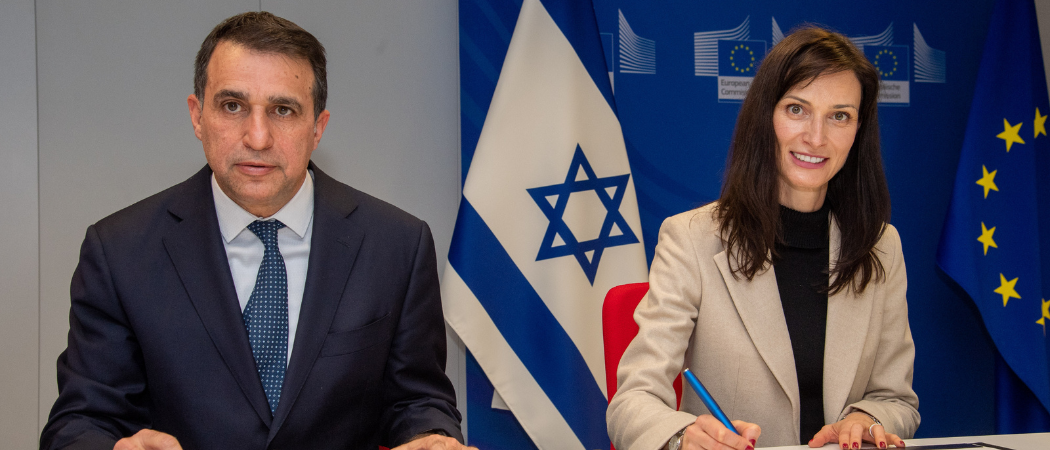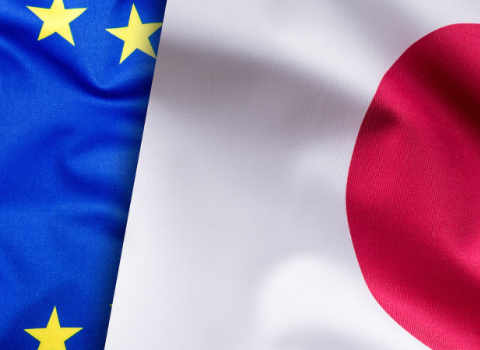Israel’s academy pleads with Europe not to cut ties. But critics say sanctions are needed to stop the country starving civilians

Ambassador Haim Regev, head of the Mission of Israel to the EU and NATO, and former EU research commissioner Mariya Gabriel, signing the Horizon Europe association agreement in 2021. Photo credits: Christophe Licoppe / European Union
Ejecting Israel from Horizon Europe would be “almost a death sentence for Israeli science,” the president of the country’s Academy of Sciences and Humanities has said, as debate grows in the EU over whether to expel the country.
Israel’s blockade of Gaza, starving the civilian population of food, has roused Europe into unprecedented criticism, with the EU announcing last week that it would review the association agreement that underpins Israel’s involvement in the EU’s €93 billion research and innovation programme.
Even Germany’s new chancellor Friedrich Merz, long a defender of Israel, now says the country’s blockade and continued attacks on Gaza can’t be justified.
With association to Horizon Europe on the line, Israel’s Academy of Sciences and Humanities issued a statement on May 24 pleading with Europe not to cut ties. But MEPs and campaigners calling for an end to association say the EU should use all diplomatic levers to pressure Israel to stop its attacks.
“God forbid, we're thrown out of Horizon Europe,” said David Harel, president of the Academy, in an interview with Science|Business. “This is almost a death sentence for Israeli science.”
Harel’s argument is that ending Horizon association would hurt Israeli scientists, who are some of the most vocal voices against the government of Benjamin Netanyahu and the war on Gaza.
“Many people, including myself, are fighting adamantly against the government and against what's going on in Gaza,” he said. “There are other ways to put pressure on Israel.”
He claims cutting scientific links won’t shift opinions in the Netanyahu government. “Parts of this government are so blind to being rational, even economically rational, that's not going to make a difference,” Harel said.
But critics of Israel say the EU should use every tool at its disposal to exert leverage. “For us there is no alternative if we want to apply pressure,” said Rudi Kennes, a Belgian MEP for the Left party who has led calls to expel Israel.
Kennes said he was sympathetic to opposition academics like Harel whose scientific collaborations would be hit. But boycotts and sanctions were needed to actually change Israeli policy. “The only thing they will understand is power play,” he said.
European governments boycotted apartheid-era South Africa, even though sanctions also hit internal opponents of the regime, Kennes pointed out, and the same approach should be applied to Israel.
“As Palestinians in Gaza are starved to death by Israel’s total blockade on aid, it is high time for the EU to finally apply the human rights clause in the EU‑Israel Association Agreement, by excluding Israel and its complicit institutions from Horizon research funding,” said Stephanie Adam, from the Palestinian Campaign for the Academic and Cultural Boycott of Israel. “If not now, when?”
Dependence on Europe
Association to Horizon Europe is particularly important to Israel because scientific links with the US are being pared back due to cuts by the second Donald Trump presidency, the Israeli Academy warned in its statement.
So far, Israel has received more than €840 million in funding from the programme, which began in 2021. Horizon Europe provides a “magnitude more” support to Israeli science than the US, said Harel.
Israel’s performance appears to be slipping, however, possibly due to boycotts by European universities and disruption in Israel caused by the war. Even now, Harel said, European scientists were dropping collaboration with Israelis.
“I've heard cases of Israeli scientists who've been collaborating with a European colleague for years and then suddenly comes an email saying, I'm going to have to stop this collaboration,” he said.
Related articles
- Data corner: Israeli participation in Horizon Europe hits record low
- Left MEPs raise concerns over Horizon Europe funding to Israel
- Academic boycotts over Gaza war jeopardise Israel’s place in Horizon Europe
This month, several Dutch universities have cut ties to Israel for a range of specific reasons. Utrecht University said it will not enter any new partnerships with Israeli organisations. “Authoritative scientific research speaks of genocidal violence,” said Anton Pijpers, president of the university’s executive board, in a statement.
The University of Amsterdam said it would end a student exchange with Hebrew University of Jerusalem, although this could be re-examined if “risk-reducing measures” were put in place.
Radboud University said it was suspending the implementation of partnerships with Tel Aviv University and Hebrew University. But it stopped short of telling its researchers to quit Horizon Europe consortia involving Israel-based partners.
This follows a wave of boycotts last year, particularly from Spanish universities.
Complicity?
One key debate in European academia is the extent to which Israeli universities are themselves complicit in the actions of the current government.
More than 1,700 Swedish researchers recently signed a declaration of “conscientious objection,” refusing to collaborate with Israeli institutions on the grounds that they are “major, willing and persistent accomplices” with “military occupation, settler-colonialism, apartheid, and now genocide.”
Meanwhile the Palestinian Campaign for the Academic and Cultural Boycott of Israel has listed multiple examples of university collaborations with the Israeli military.
In response, Harel said he could “very well understand” a European researcher who refused to collaborate with, for example, an Israeli nautical engineering working on jet propulsion for rockets.
But he said there were plenty of research collaborations that would not aid the Israeli military or security services. “I'm not arguing that everything is kosher,” he said. “I’m just saying that the solution to the problem is not to cut scientific ties.”
Editor's note: This article was updated 30 May 2025. Rudi Kennes is a Belgian MEP.





 A unique international forum for public research organisations and companies to connect their external engagement with strategic interests around their R&D system.
A unique international forum for public research organisations and companies to connect their external engagement with strategic interests around their R&D system.